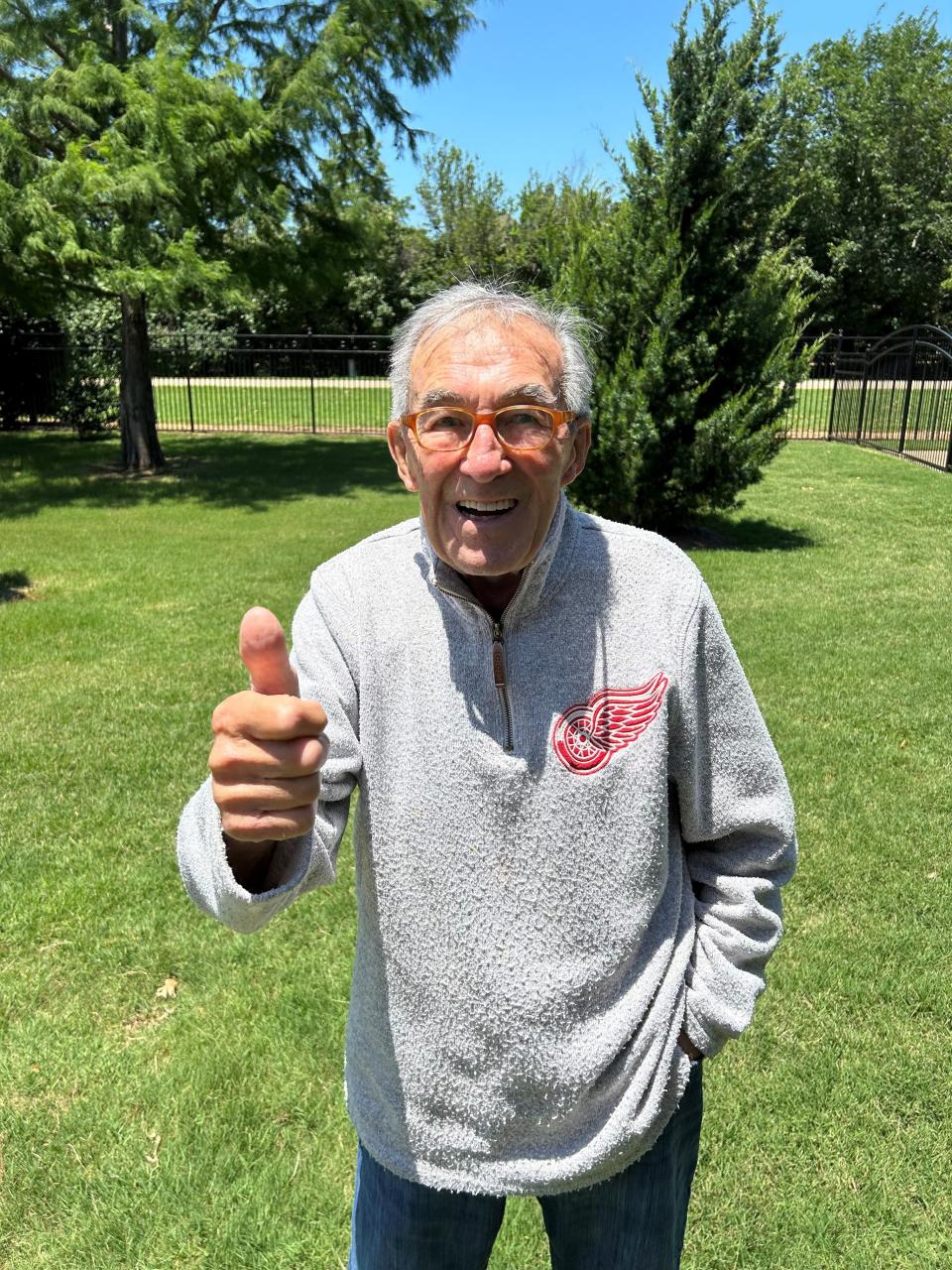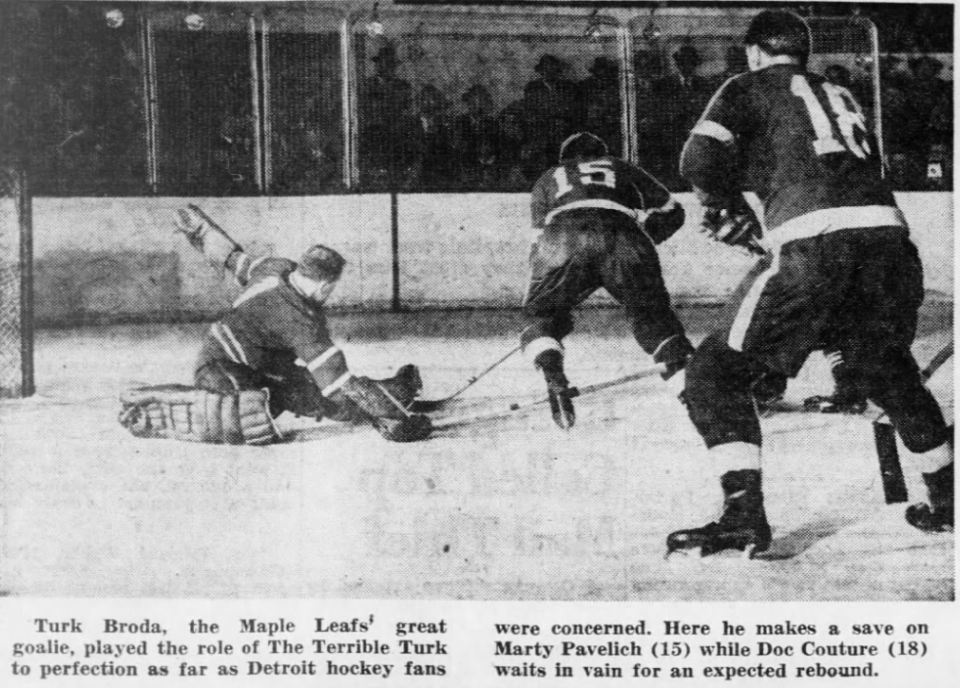Marty Pavelich, Detroit Red Wings 1950s champion, reflects on career after ALS diagnosis
Marty Pavelich is the last surviving member of the Detroit Red Wings' 1950 championship team.
Pavelich is a four-time Stanley Cup champion who had a fantastic career, and his memory remains alert, even as his body is failing him.
"I may not have been the most talented member of those teams but you were never going to outwork me," Pavelich reflected. "Nor could you ever have more desire to win than I did. I would like to think my legacy and what I am most proud of was my leadership in the locker room. I hated to lose — still do — and that is what I have attempted to pass on to all of the young people in sports and business I have met through the years."
Pavelich, 96, reflected on that time in an interview this weekend with the Free Press. Pavelich relayed his answers in email form through his son, Andrew Hofley, with whom he is staying with in the Dallas area.
Hofley told the Free Press that Pavelich was diagnosed with ALS (amyotrophic lateral sclerosis, also known as Lou Gehrig's disease) about a month ago. "The ALS has decimated him in the past year," Hofley said. "His mind is still 100% but his body is failing him."

In his prime, Pavelich was 5 feet 11 and 168 pounds of determination. He debuted with the Wings on Dec. 10, 1947, and scored his first goal in his second game, a 4-3 victory on Dec. 13 over the Chicago Black Hawks (the club became known as the Blackhawks in 1986). The Dec. 14 edition of the Free Press described the goal: "Pavelich scored the opener in the first five minutes of play, batting a loose puck past Emile (The Cat) Francis after Gordie Howe's pass bounced off a Chicago player."
It wasn't so much scoring that Pavelich became known for — he recorded 93 goals among 252 points in 633 games — as it was preventing opposing stars from scoring. Pavelich was renown for his defensive prowess, which included having to shadow Montreal Canadiens legend Maurice "Rocket" Richard.
Future generation: Which Red Wings prospects should we expect on next season's roster?
"If I saw Rocket Richard walking toward me on the sidewalk, one of us would have crossed the street so as to not have to say hello," Pavelich wrote. "You also have to remember that in those days, we traveled to five of the cities by train. Most of the time, games were home-and-home, so the opposing teams were on the same train between Detroit and Montreal, or Toronto, or Chicago, etc. The rivalry on the ice often transferred onto the trains until the railroad figured out they should put the club car in between the teams’ berthing cars. Suffice it to say those train rides were interesting."
One of Pavelich's favorite stories is the time he checked Richard so hard the Canadien suffered a cut above the eye. Later in the game, Richard was going to run Pavelich from behind, but Bob Goldham yelled at Pavelich to watch out, and he escaped injury.
Pavelich won his first Stanley Cup in 1950. The first series, against the Toronto Maple Leafs, went seven games. The Wings were shut out by Turk Broda in Game 5, putting them on the brink of elimination, but Pavelich scored the first goal in the next game, helping the Wings to a 4-0 victory and sending the series back to Olympia Stadium, where the Wings won, 1-0. Pavelich had two goals in the Stanley Cup Final against the New York Rangers, which also went seven games and featured three overtime games, including two overtimes in Game 7.
A second Cup followed in 1952.

"The 1952 team was special," Pavelich wrote. "We were awesome. We won the Cup in eight straight and could have played all summer long without losing.
"Gordie’s nickname in the locker room was 'Power.' He was the strongest human being I had ever met up until that point of my life — 19-inch neck and arms like Popeye. But, as great as Gordie was, he had the tendency to think too much and become his own worst enemy. Jack Adams placed my locker next to Gordie’s because I was the one guy who had the ability to tell Gordie, snap out of it, you’re thinking too much and weakening the team.
"Ted Lindsay was pound-for-pound the fiercest competitor I ever knew. I have often told people that if I were to choose my all-time team across the decades, Ted Lindsay would be my first pick, Gordie Howe second, and Mark Messier third. Teddy was my best friend and of course my business partner at Lindsay & Pavelich for over four decades. He was my brother.
"When I broke into the league, there were quite a few WWII veterans that had left their NHL careers to serve. Sid (Abel) and Black Jack Stewart were two of the key guys on that team. (They) provided the veteran leadership that was instrumental for all of the younger players that became the core of the championship teams that followed."
Pavelich was part of two more championships, in 1954 and '55. But soon after the 1955 championship, Bruce Norris ousted his sister, Marguerite, who had been named president of the team in 1952 as directed by the will of her father, James E. Norris, who bought the franchise in 1932. Where Marguerite stood up to Adams, Bruce folded — and let Adams tear apart the team, including trading Lindsay and Terry Sawchuk. The Wings advanced to the Stanley Cup Final in 1956, losing to Montreal, but after that came a decline that lasted until Mike and Marian Ilitch bought the team in 1982.
READ MORE: How Red Wings changed in the 40 years since Mike Ilitch bought team from Norris

"We could have easily won another three or four Cups if not for Jack Adams," Pavelich said. "I believe his motivation to break up those teams was twofold. One, he was arrogant and thought he could swing the big blockbuster trade. Of course, the results speak for themselves. His second reason was to keep the players from forming the NHLPA. Teddy was leading those discussions at the time and I believe that is what led to Adams to trade him to Chicago.
"Jack Adams referred to Gordie, Teddy, Red (Kelly) and I as the 'Dead-end kids.' He vowed the four of us would never be traded. A vow he did not keep. In my case, Adams sat me down after my 10th season and told me he was sending me down to the minors. He claimed no other team wanted me. I told him, I quit, and walked out. He was furious of course because he was bluffing and ended up getting nothing for me in a trade. I found out subsequently that the Black Hawks, Rangers and Bruins all wanted me — but I had made up my mind. I wanted to start my business career which was the smartest thing I ever did. That was Jack Adams."
Pavelich still follows the team, describing himself as "bleeding Red Wings red," and relishing the memories of what a time it was for the franchise in his playing days.
"I have been blessed to have been part of the NHL and the Detroit Red Wings organization," Pavelich said. "I am so thankful to the team and the city of Detroit. There was no other place I wanted to play. Detroit in the late ‘40’s/early ‘50’s was one of the nicest cities in the U.S., if not the world. It was the place to be and the fans — I can’t describe how much I appreciated the city and how supportive the fans were of the Red Wings."
Contact Helene St. James at hstjames@freepress.com. Follow her on X @helenestjames.
Read more on the Detroit Red Wings and sign up for our Red Wings newsletter. Her latest book, “On the Clock: Behind the Scenes with the Detroit Red Wings at the NHL Draft,” is available from Amazon, Barnes & Noble and Triumph Books. Personalized copies available via her e-mail.
Feeling a draft
What: 2024 NHL draft
When: June 28-29; Sphere, Las Vegas; ESPN
The Wings’ top pick: No. 15, their lowest first pick since 2016 (No. 20, D Dennis Cholowski)
The top five: 1. San Jose, 2. Chicago, 3. Anaheim, 4. Montreal, 5. Columbus
This article originally appeared on Detroit Free Press: Marty Pavelich reflects on 1950s Detroit Red Wings amid ALS battle

